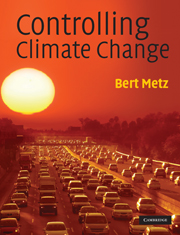Book contents
- Frontmatter
- Contents
- Preface
- 1 Climate change and its impacts: a short summary
- 2 Greenhouse gas emissions
- 3 Keeping climate change within sustainable limits: where to draw the line?
- 4 Development first
- 5 Energy Supply
- 6 Transportation
- 7 Buildings
- 8 Industry and waste management
- 9 Land use, agriculture, and forestry
- 10 How does it fit together?
- 11 Policies and measures
- 12 International climate change agreements
- Index
- Plate section
12 - International climate change agreements
Published online by Cambridge University Press: 05 June 2012
- Frontmatter
- Contents
- Preface
- 1 Climate change and its impacts: a short summary
- 2 Greenhouse gas emissions
- 3 Keeping climate change within sustainable limits: where to draw the line?
- 4 Development first
- 5 Energy Supply
- 6 Transportation
- 7 Buildings
- 8 Industry and waste management
- 9 Land use, agriculture, and forestry
- 10 How does it fit together?
- 11 Policies and measures
- 12 International climate change agreements
- Index
- Plate section
Summary
What is covered in this chapter?
Is international cooperation to address climate change a matter of sharing a common burden between countries or of maximizing the benefits of preventing climate change damages? The perspective taken determines to a large extent the shape of international agreements. This chapter discusses the current international arrangements and how they work. The Climate Change Convention and its Kyoto Protocol in particular. It tries to make the complex international negotiation process and its outcomes understandable for non-specialists. It also discussed the ongoing negotiations on arrangements for the period after 2012, when the agreed actions under the Kyoto Protocol to reduce greenhouse gas emissions expire.
Will these negotiations result in aggressive action to curb emissions worldwide, so that the worst impacts can be avoided? Or will political differences and North–South tensions lead to a delay in ambitious action and serious damages in the long term? What are the key issues and what are the prospects for agreement? These are issues discussed in this chapter.
Why are international agreements needed?
Climate change is a typical example of a ‘global commons’ problem. Everybody on the planet benefits from a stable climate, but that can only be achieved if everybody participates. Not participating, i.e. leaving it to others to reduce greenhouse gas emissions and keep forests intact, is tempting: the contributions from most individual countries are small and no economic sector covers more than 25% of the total emissions (see Chapter 2).
- Type
- Chapter
- Information
- Controlling Climate Change , pp. 318 - 350Publisher: Cambridge University PressPrint publication year: 2009
- 1
- Cited by



